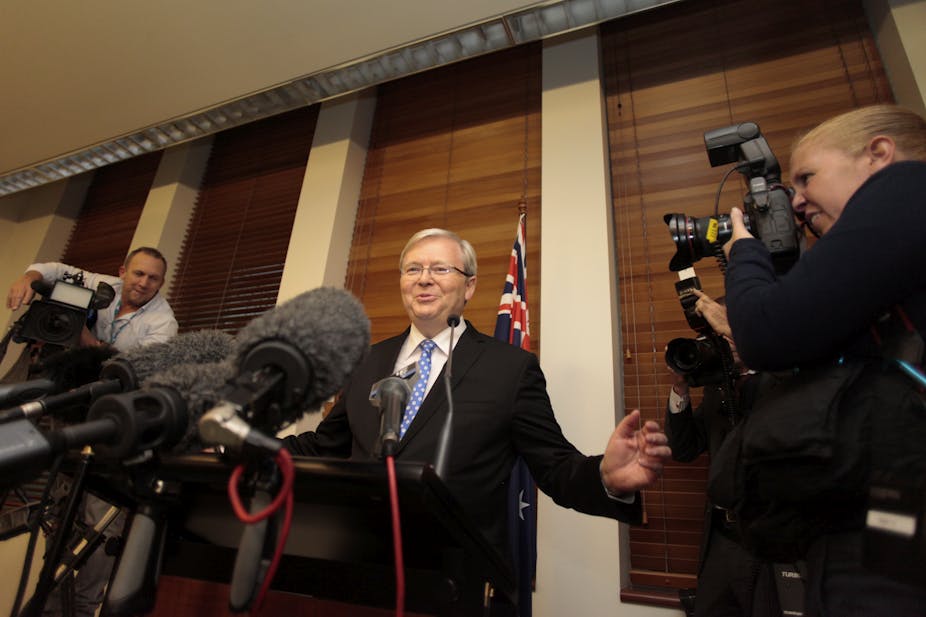Kevin Rudd has made a Lazarus-like return to the prime ministership after winning a party room ballot this evening by a vote of 57-45. Rudd, who led the party to success at the 2007 election, replaces his successor, Julia Gillard, after one of the most turbulent periods in Australian political history.
So where did it all go wrong for Gillard, who swept to power in 2010 off the back of replacing a “good government that had lost its way”?
These are grim days for Labor, probably the worst since the trauma of the 2001 Tampa election where the dream of a Kim Beazley Labor government crumbled and John Howard was transformed from struggling incumbent to political giant almost overnight. At least in 2001 Labor was crushed by the resources of an incumbent government, but now its woes are self-inflicted.
Nothing in politics happens without many causes but sometimes we can simplify matters. There is one fundamental driver of Julia Gillard’s plight: the poor performance of the Labor government in opinion polls. However, “polls” mean nothing of themselves: they are always read in a context. Since 2010 the context has steadily worsened for Labor and now Gillard has run out of time.
After the 2010 election many blamed Labor’s inept campaign for the close result, and anticipated an eventual recovery in Labor support. These hopes were soon dashed - it seemed at the time by the unpopularity of the carbon tax. Once the tax passed and its minimal effects were apparent, many hoped for a Labor recovery. They could point to the American example: US president Barack Obama recovered from the initial unpopularity of his healthcare reforms.
For a time after the implementation of the carbon tax Labor seemed to rally, one opinion poll in late 2012 put the party’s support 49% on a two party preferred basis. This was a false dawn: inexorably the government’s support has slumped this year. Gillard’s admirers have pointed to the government’s strong legislative record, but this posed the question of why this record did not translate into public support. The government’s drift to the right on asylum seeker policy dispirited many supporters, but yielded little opinion poll dividend.
The legacy of the 2010 election campaign has also cast a shadow over Gillard. Paul Keating and John Howard both struggled in the polls in their last terms but both could point to their record of victory against the odds in 1993 and 2001 respectively. This helped them sustain the loyalty of their backbench. Gillard has not been able to point to a previous example of success.
The Labor debacles at the NSW, Queensland and WA state elections have also generated alarm among federal Labor MPs. It now seems that even traditionally safe Labor seats in ethnic suburbs of the major cities are at risk.
Keating and Howard also faced a more divided opposition. John Hewson, Alexander Downer, Kim Beazley and Mark Latham struggled to unite their parties. Tony Abbott has led a remarkably united Liberal party; the apparent certainty of electoral success has also bolstered his support. Gillard has faced a vicious circle of decline, Abbott a spiral of growth.
In 2010 many Gillard supporters hoped that she, like former WA premier Carmen Lawrence or former Victorian premier Joan Kirner a generation earlier, would rally Labor voters, but she has failed to achieve this. Gillard has appealed to very strong Labor supporters, hence the dogged loyalty of most MPs to her cause. Her problem is that Labor’s true believers are now few and far between.
Gillard failed to appeal beyond this narrow core to floating voters. Today, swing voters are no longer just the middle-class suburbanites of the 1990s but include many recent migrant groups, such as Asian-Australians, whom Kevin Rudd charmed. The Australia Labor Party of Hawke and Keating, whose cause Gillard has doggedly defended in many aspects, is now a thing of the past.
Gough Whitlam predicted after 1975 that the power of the Senate to block supply would generate constant political instability. Governments, he argued, would be forced to the polls whenever their popularity slumped. This pattern did not occur but now something similar has emerged. The axe that hangs over leaders is no longer that of an election but the prospect of poll-driven mutiny in their ranks. The media are no longer just the audience of the political drama but players in their own right.
In 2010 Labor MPs installed Julia Gillard in response to Rudd’s political missteps. It was a testimony to Gillard’s personal and political skills that she was until now able to survive political waves far greater than those that toppled Kevin Rudd in 2010, but her time has run out.

